
Mariah Carey is an American singer, songwriter, record producer, and actress. Referred to as the "Songbird Supreme" by Guinness World Records, she is noted for her songwriting, five-octave vocal range, melismatic singing style and signature use of the whistle register. An influential figure in popular music, Carey is credited for impacting the vocal style in contemporary music, merging hip-hop with pop music through her collaborations and popularizing the use of remixes. She has also been dubbed the "Queen of Christmas" for the enduring popularity of her holiday music, particularly the 1994 song "All I Want for Christmas Is You", which is the best-selling holiday song by a female artist.

Pure Frosting is a compilation album by the American alternative rock band The Presidents of the United States of America. It was released on March 10, 1998.

Butterfly is the sixth studio album by American singer-songwriter Mariah Carey, released on September 10, 1997, by Columbia Records. The album contains both hip-hop and urban adult contemporary sounds, as well as some softer and more contemporary melodies. Throughout the project, Carey worked with Walter Afanasieff, with whom she had written and produced most of the material from her previous albums. She also worked with many famed hip-hop producers and rappers, such as Sean "Puffy" Combs, Q-Tip, Missy Elliott and the Trackmasters. With the latter acts producing most of the album, Butterfly deviated from the adult contemporary sound of Carey's previous albums.
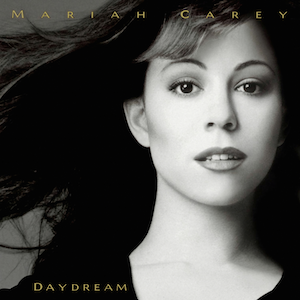
Daydream is the fifth studio album by American singer-songwriter Mariah Carey, released on September 26, 1995, by Columbia Records. The follow-up to her internationally successful studio album Music Box (1993), and the holiday album Merry Christmas (1994), Daydream differed from her previous releases by leaning increasingly toward hip hop and urban music. Throughout the project, Carey collaborated with Walter Afanasieff, with whom she wrote and produced most of her previous albums. With Daydream, Carey took more control over the musical direction as well as the album's composition. Carey considered the album to be the beginning of her musical and vocal transition, a change that would become more evident in her sixth studio album Butterfly (1997). During the album's production, Carey endured many creative differences with her label and then-husband Tommy Mottola. On Daydream, Carey collaborated with Jermaine Dupri, Kenneth "Babyface" Edmonds, and R&B group Boyz II Men. With Afanasieff's assistance and the addition of a few contemporary producers, she was able to make a subtle transition into the contemporary R&B market, after previously only pursuing pop, adult contemporary and traditional R&B music.
"Sweetheart" is a song originally recorded by American singer Rainy Davis. It was written by Davis and Pete Warner, and produced with Dorothy Kessler. The track was released in 1986 by independent record label SuperTronics as a single from Davis's 1987 studio album Sweetheart. A freestyle, hip hop pop, and synth-funk song, "Sweetheart" appeared on R&B and dance music-based record charts in the United States.

"When You Believe" is a song from the 1998 DreamWorks musical animated feature The Prince of Egypt. It was written and composed by Stephen Schwartz. A pop single version of "When You Believe", with additional music and lyrics by writer-producer Kenneth Edmonds (Babyface), was also recorded for the film by American singers Whitney Houston and Mariah Carey for the film's end credits and its soundtrack album by DreamWorks Records. Additionally, the song serves as the soundtrack's lead single on November 2, 1998 and for both Houston's fourth studio album, My Love Is Your Love by Arista Records and Carey's first compilation album, #1's by Columbia Records. The original version of the song, featured in the narrative portion of the film, is performed by Sally Dworsky, Michelle Pfeiffer, and a children's choir. "When You Believe" is described as a big ballad, with meaningful and inspirational lyrics, describing the ability each person has to achieve miracles when they reach out to God and believe.
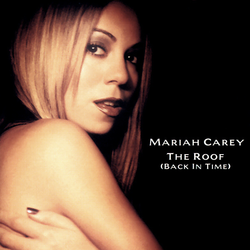
"The Roof (Back in Time)" is a song by American singer-songwriter Mariah Carey, taken from her sixth studio album, Butterfly (1997). It was released as the third single from the album in Europe, on March 16, 1998, by Columbia Records. Similar to the treatments of "Butterfly" and "Breakdown", "The Roof" received a limited worldwide release due to Carey's conflict at the time with Sony. The song was written and produced by Carey and Trackmasters, and is built around a sample from "Shook Ones (Part II)" (1995) by American hip hop duo Mobb Deep. The song's lyrics recount an intimate roof-top encounter between lovers, and how the memory affects the protagonist. The extended remix features a rap verse by Mobb Deep; both versions were praised by contemporary music critics.
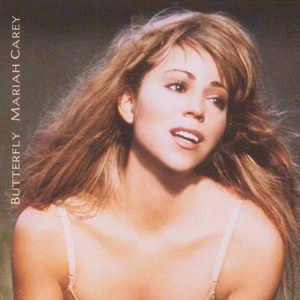
"Butterfly" is a song recorded by American singer-songwriter, and record producer Mariah Carey for her sixth studio album of the same name (1997). It was released on September 29, 1997, by Columbia Records as the second single from the album. The song was written and produced by Carey and Walter Afanasieff. "Butterfly" is a pop and R&B ballad combining elements of gospel. Carey had originally conceived it as a house record with David Morales titled "Fly Away". After realizing how personal the lyrics were and how they could be applied to Butterfly, she wrote the album's title track with Afanasieff. On the song's lyrics, Carey sings to someone, telling them to spread their wings and release into the world on their own, like a butterfly.
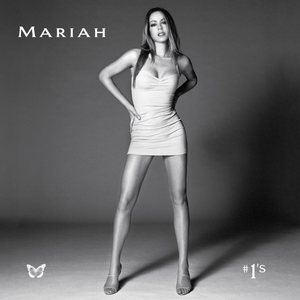
#1's is the first greatest hits album by American singer-songwriter Mariah Carey, released by Columbia Records on November 17, 1998. The album contained Carey's then thirteen number-one singles on the Billboard Hot 100, as well as four new songs. In Japan, the album also included her popular single, "All I Want for Christmas Is You", which was Carey's biggest selling single there.

"Dreamlover" is a song recorded by American singer-songwriter and record producer Mariah Carey, released on July 27, 1993 by Columbia, as the lead single from the singer's third studio album, Music Box (1993). Its lyrics were written by Carey, with music composed by Carey and Dave Hall, and was produced by Carey, Walter Afanasieff and Hall. The song incorporates a sample of the hook from "Blind Alley" by the Emotions—previously used in "Ain't No Half-Steppin'" (1988) by Big Daddy Kane—into its melody and instrumentation. "Dreamlover" marked a more pronounced attempt on Carey's part to incorporate hip hop into her music, as was seen in her decision to work with Hall, who had previously produced What's the 411? (1992) by Mary J. Blige. This was partly in light of the mixed reception to her previous studio effort Emotions (1991), which featured gospel and 1960s soul influences. Lyrically, the song pictures a protagonist calling for a perfect lover, her "dreamlover," to whisk her away into the night and not "disillusion" her like others in the past.

"My All" is a song by American singer-songwriter Mariah Carey from her sixth studio album, Butterfly (1997). It was released as the album's fifth single overall and second commercial single on April 21, 1998, by Columbia Records. The song was written and produced by Carey and Walter Afanasieff. "My All" is built around Latin guitar chord melodies, and makes subtle use of Latin percussion throughout the first chorus, before taking on a more conventional R&B-style beat. Carey was inspired to write the song and use Latin inspired melodies after a trip to Puerto Rico, where she was influenced by the culture. The song's lyrics tell of a lonely woman declaring she would give "her all" to have just one more night with her estranged lover. It is the first song Carey wrote for the Butterfly album.

"Hero" is a song by American singer-songwriter, and record producer Mariah Carey released on October 18, 1993, via Columbia Records as the second single from her third studio album, Music Box (1993). The song was originally recorded by Gloria Estefan. The song was written and produced by Carey and Walter Afanasieff. While writing the song, Carey did not connect to its style or sound, therefore forfeiting it over to Estefan who sang it for the soundtrack of the film of the same name (1992). However, after being convinced by Sony executive Tommy Mottola to keep it, she changed some of the lyrics to more precisely fit her personality. Lyrically, the song is regarded as one of Carey's most inspirational and personal ballads, with its protagonist declaring that even though people may feel discouraged or down at times, in reality, they are "heroes" if they look inside themselves and see their own inner strength; in time, it will help them "find the way".

Emotions is the second studio album by American singer-songwriter Mariah Carey. It was released on September 17, 1991, by Columbia Records. The album deviated from the formula of Carey's 1990 self-titled debut album, as she had more creative control over the material she produced and recorded. Additionally, Emotions features influences from a range of genres such as gospel, R&B and 1950s, 1960s and 1970s balladry infusion. On the record, Carey worked with a variety of producers and writers, including Walter Afanasieff, the only holdover from her previous effort. Additionally, Carey wrote and produced the album's material with Robert Clivillés and David Cole from C+C Music Factory and Carole King, with whom she wrote one song.

Music Box is the third studio album by American singer-songwriter Mariah Carey. It was released by Columbia Records on August 31, 1993. The album comprises ballads primarily written by Carey and Walter Afanasieff, with whom she had previously worked on Emotions (1991), and a few urban dance tracks. During the course of the album's development, Carey wanted to broaden her audience, choosing a more pop/R&B oriented sound. During this time frame, she experimented with different musical instruments, leading the album's sound away from her more contemporary previous two efforts.
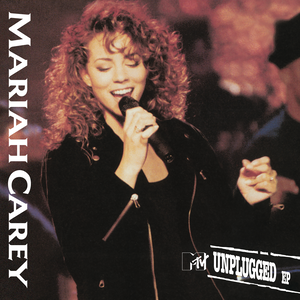
MTV Unplugged is a live EP by American singer-songwriter Mariah Carey, released in the United States on June 2, 1992, by Columbia Records. Following the success of Carey's previous two albums and the growing critical commentary on her lack of concert tours and unsubstantial televised performances, Sony organized a live performance show at the Kaufman Astoria Studios, New York on March 16, 1992. The show, titled MTV Unplugged, originally aired on MTV to help promote Carey's second album Emotions, as well as help shun critics who deemed Carey a possible studio artist. However, after its success, the show was released to the public as an EP, with an accompanying VHS titled MTV Unplugged +3.
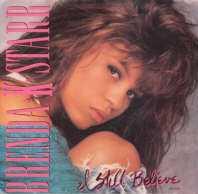
"I Still Believe" is a song written and composed by Antonina Armato and Giuseppe Cantarelli, and originally recorded by pop singer Brenda K. Starr for her eponymous second studio album, Brenda K. Starr (1987). It is a ballad in which the singer is confident she and her former boyfriend will be together again one day. It is Starr's biggest hit in the United States, reaching the top-twenty on the Billboard Hot 100 and being considered her signature song. "I Still Believe" was covered by American singer Mariah Carey, a former backup singer for Starr before she achieved success, for her #1's album in 1998 and released as a single in 1999. It was also recorded by Cantopop singer Sandy Lam in 1989.
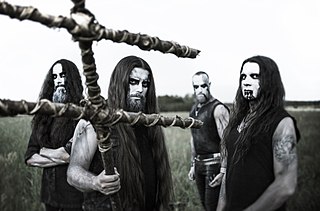
Hate is a blackened death metal band from Poland. The band was formed in 1990 by guitarist and vocalist Adam "ATF Sinner" Buszko, guitarist Quack and drummer Mittloff. The band lineup has changed many times over the years. They have released twelve full-length studio albums to date, as well as a number of early demos and EPs. Their most recent album, Rugia, was released on October 15, 2021 through Metal Blade Records.
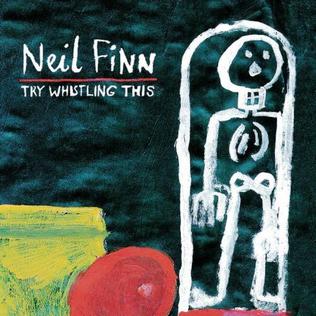
Try Whistling This is the debut solo album released in 1998 by New Zealand singer/songwriter Neil Finn. The Japanese version of the album has a bonus track called "Tokyo", which also appears on the UK release of the single "Sinner". Special editions of the Australian CD contained a bonus CD with six extra tracks which were used as the B-sides for the singles released from the album. The album topped the charts in Australia and New Zealand, and also reached the top five of the UK Albums Chart.

Sessions at West 54th is a solo music video album released in December 2000 by New Zealand singer-songwriter, Neil Finn as part of the United States live musical television series, of the same name. His live performance was recorded in 1999 and mostly has tracks from Finn's debut solo album, Try Whistling This, although it also included two tracks from his recent group, Crowded House, and one from his earlier group, Split Enz.
Dean Owens is a Scottish singer songwriter, born and brought up in Leith, Edinburgh, UK. Many of Owens' songs relate to his upbringing in the area, including Man From Leith.


















